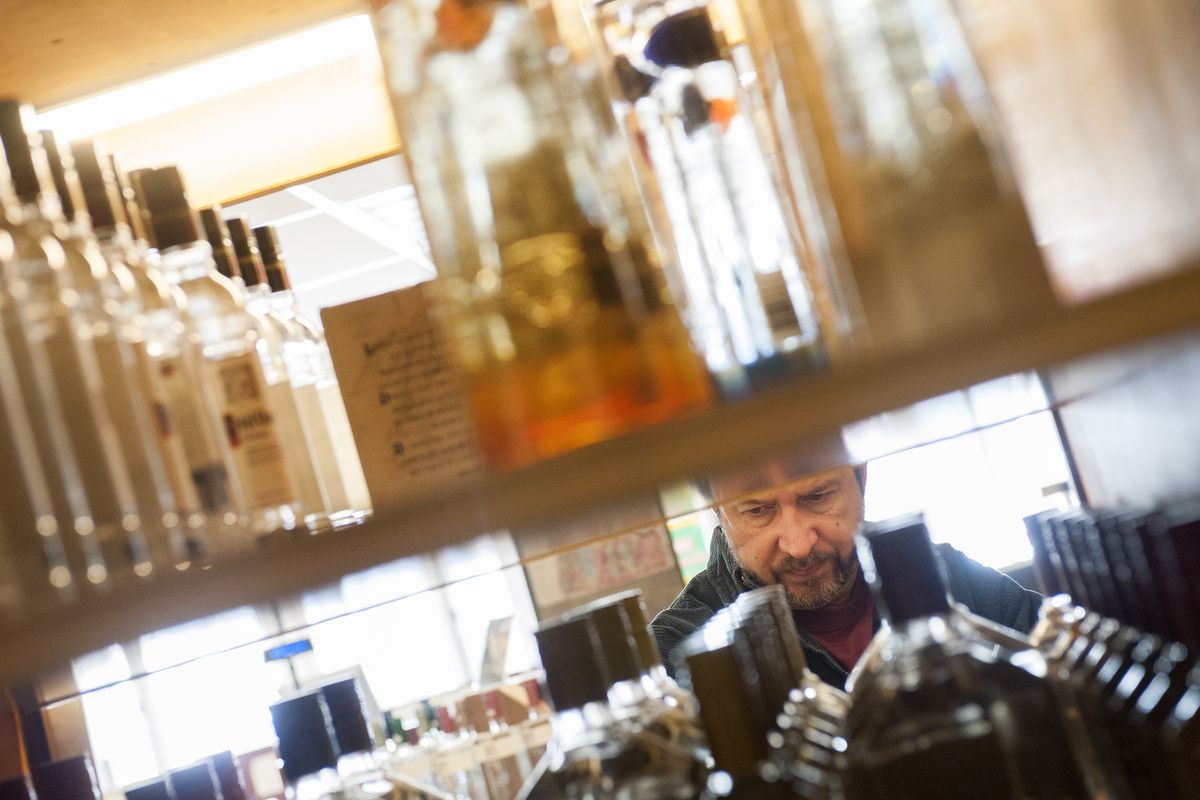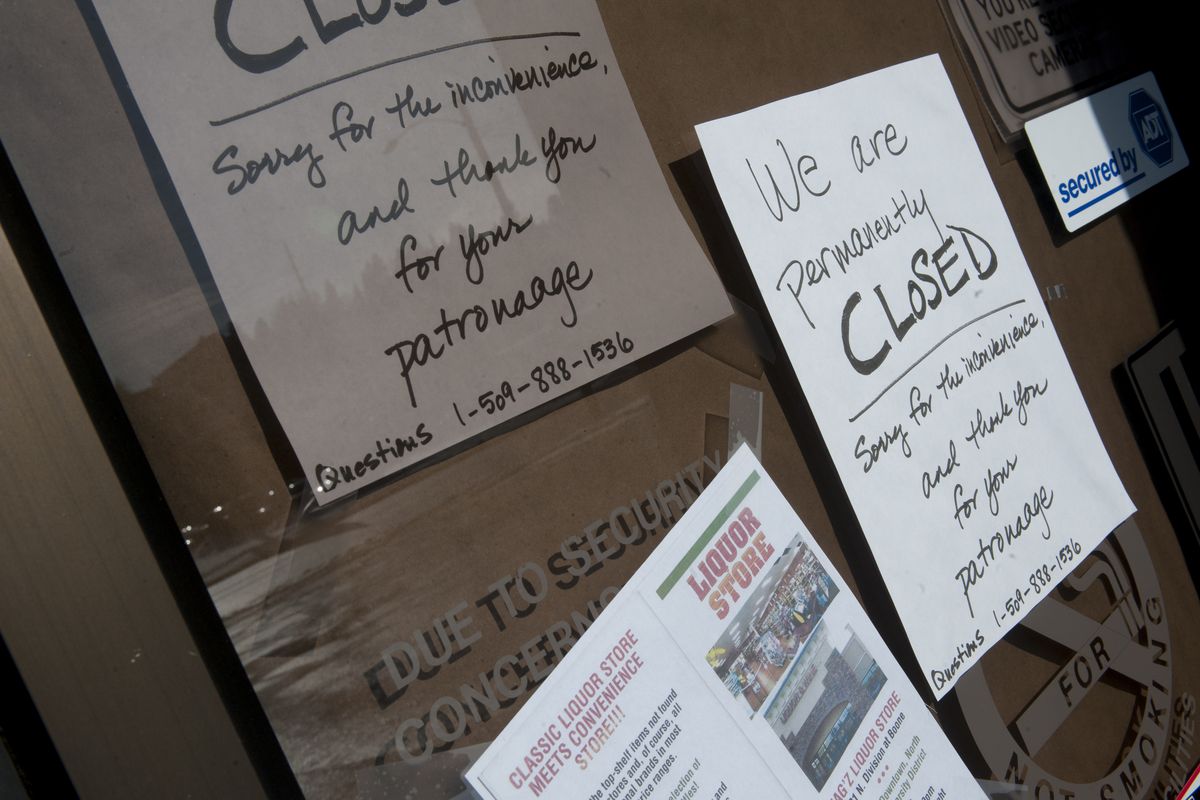Add-on state fee driving small liquor stores out of business
Manager Ron Stathes takes inventory of his stock at B’s Liquor and Wine in Spokane in this Feb. 11, 2014 photo. The store combined with B’s Market next door after struggling to compete against giant liquor retailers when Washington voters privatized liquor sales in 2011. (Tyler Tjomsland)Buy a print of this photo
Two weeks ago Dave Mehelich closed his Good Spirits liquor store.
For years the shop at 1322 W. Third Ave. was a state-run business that bustled with customers.
Today it’s another example of the struggles of small liquor stores attempting to complete against giant retailers.
When Washington voters privatized liquor sales in 2011, regulators auctioned off 11 liquor stores in Spokane County to aspiring business people. Of those 11 stores sold, six remain open.
People tracking the private retail liquor industry in Washington say such closures will continue unless retail taxes are changed.
The store Mehelich just closed was once one of the busiest liquor stores in Eastern Washington. He paid $130,000 for it, saying he was led to believe it would continue netting large annual sales.
State officials, however, say they urged buyers to do their homework and made no guarantee of future sales as major retailers such as Costco, Fred Meyer and other grocers dove into the sale of spirits.
About one-third of all state liquor stores taken over by private owners have now closed, according to the Washington Liquor Control Board. The state ran 167 stores before 2012; 116 of those still operate.
Those numbers don’t include about 160 former contract liquor stores run by private owners who shared a portion of their revenue with the state. Spokane still has several former contract stores in operation.
Smaller shop owners such as Mehelich have to pay a 17 percent fee on liquor sales, and originally had to add that cost on sales to large customers like bars and hotels. That fee is separate from sales taxes on liquor.
The 17 percent surcharge was added to the initiative as a way to recoup fees the state lost in allowing private liquor sales. The initiative was also drafted so distributors could sell liquor to larger “resale” customers without the 17 percent fee.
Small stores couldn’t compete, said Mehelich. The Davenport hotel group, the Third Avenue store’s largest customer, stopped placing orders.
Mehelich and other small liquor retailers say the 17 percent surcharge has been the driving force behind small store closures.
Big retailers pay the same 17 percent fee but they spread the hit across their vast inventory, allowing them to keep liquor prices lower than the smaller stores, Mehelich said.
“For us who can’t do that, that 17 percent is killing us,” he added.
In the current short session in Olympia, some state Senate and House members have tried, so far unsuccessfully, to provide a 10 percent tax break for smaller liquor retailers. They’re trying to extend concessions passed last year when the Legislature allowed former state and contract stores to sell to restaurants and bars without charging the 17 percent fee.
Rep. Cary Condotta, R-Wenatchee, a cosponsor of a bill this session, said last year’s change didn’t stop the bleeding, as liquor distributors marked down their prices to keep their contracts with their hotel and bar customers.
Condotta cosponsored HB 2412, which would cut the fee from 17 percent to 7 percent for former state-run and state contract liquor stores with monthly gross sales of $300,000 or less. Most of those stores fall below that sales level.
As of Tuesday, his bill appeared dead, having failed to move out of the House Finance Committee by the bill deadline.
However, Senate Bill 6237, a companion to the House bill, is alive and moving forward. It would eliminate the 17 percent fee for all retailers with monthly gross receipts of $250,000 or less. It would cut it to 7 percent on other retailers with $350,000 or less in monthly sales.
That bill has been sent to the Senate Rules Committee.
Condotta said he supported the bill because small store owners got a bad deal. “The handoff from the state to the store owners was not handled well. This is a way of mitigating all the things they’ve gone through,” he said.
Another owner of a former Spokane state liquor store, Nick Basrai, kept track of Condotta’s bill and hoped it became law.
The company formed by Basrai paid $360,000 to take over the former state liquor store at 1022 W. Garland Ave. His business, B’s Liquor and Wine, lost money through much of 2013.
Basrai said that on March 1 he will move the liquor store next door to his smaller second Spokane business, B’s Garland Market. The move will cut his rent and utility bill by roughly $7,000 a month, he said.
“I hope the change doesn’t cost me any of my customers,” Basrai said.
Basrai bought the store believing he could generate about one-third of the sales the state was getting.
“But I’m probably getting maybe 5 to 10 percent of what it was getting before,” he said.
“It (HB 2412) could help me a lot. We really need some help to stay in business.”

